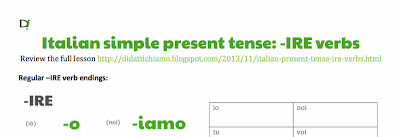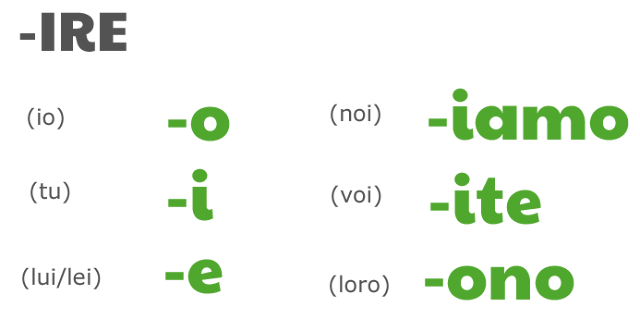OUR NEW NAME AND ADDRESS IS VIA OPTIMAE! {www.viaoptimae.com}
Didattichiamo! will slowly be phased out, so read this post on our new site and subscribe by email to receive our latest updates.
Today, we're going to look at the Simple Present Tense and in particular, -IRE verbs:
In case you missed the previous posts in this series, start there first: UPDATE: all links redirect to the same posts on the new site, Via Optimae
(1) How Italian verbs work, (Intro to verbs & grammar terms)
(2) Italian present tense: -ARE verbs
(3) Italian present tense: -ERE verbs
(1) How Italian verbs work, (Intro to verbs & grammar terms)
(2) Italian present tense: -ARE verbs
(3) Italian present tense: -ERE verbs
-IRE verbs are divided into two groups:
The first group is "normal": drop the infinitive ending (-IRE) and add the present tense -IRE endings:
The first group is "normal": drop the infinitive ending (-IRE) and add the present tense -IRE endings:
Dormo
I sleep
Dormo di lato.
I sleep on my side.
+
-Dormi di lato?
Do you sleep on your side?
-Sì, dormo di lato.
Yes, I sleep on my side.
-Dormono di lato?
Do they sleep on their side?
-No, dormono a pancia in giù.
No, they sleep on their stomach.
Using the above examples as clues, how would you say: "We sleep on our side" ? ("We" is "noi", review subject pronouns if needed in: How Italian Verbs Work— UPDATE: links to the same post on the new site, Via Optimae)
[Highlight below to reveal answer]
Dormiamo di lato.
Here are some other regular in the present tense -IRE verbs:
sentire - to sense (esp. hear)
aprire - to open
offrire - to offer
Can you write out the present tense conjugations for each?
↓
~ I recommend writing them out in a two column, three row table format so that you can refer back to them easily… You can also use one of the following free printable PDFs… Choose either blank or with a quick summary:
UPDATE: all links (including worksheet links) redirect you to this post on the new site: Via Optimae
 |
| Blank conjugation tables
(Blank so you can use them to practice any tense conjugation)
|
-or-
 |
| Italian simple present tense -IRE Summary and tables (A summary of this lesson next to blank tables to help you practice.) |
~
You can verify your answers or look up the conjugation for any verb/tense in Word Reference's handy conjugator:
. . . |
| The simple present tense is the first column of the first row labeled "presente." ~ |
The second group of -IRE verbs take -ISC- What does that mean? You just add an -ISC- after the stem of the verb and before the -IRE present tense endings. This is done for all of the subjects, except noi and voi.
So, to conjugate one of the -ISC- verbs, 'finire' in the 1st person "io", I drop the -IRE, add -ISC- and then add the "io" present tense ending "o."
 |
Finisco
I finish
Finisco di lavorare presto.
I finish work early.
-Finisci di lavorare presto?
Do you finish work early?
-Sì, finisco di lavorare presto.
Yes, I finish work early.
-Finiscono di lavorare presto?
Do they finish work early on Tuesdays?
-No, non finiscono di lavorare presto.
No, they don't finish work early.
Using the above examples as clues, how would you say: "We finish work early." ? ("We" is "noi", review subject pronouns if needed in: How Italian Verbs Work— UPDATE: redirects you to same post on the new site, Via Optimae)
[Highlight below to reveal answer]
Finiamo di lavorare presto.
Here are some other -IRE verbs that take -ISC-:
capire - to understand
pulire - to clean
Can you write out the present tense conjugations for each?
Unfortunately, there is no way to tell if an -IRE verb takes -ISC- just by looking… You'll just have to memorize which is which… All the verbs in the image at the beginning of the post are regular— the ones marked with asterisks (*) take -ISC-. Look them up in a dictionary if necessary and use them to practice!
Happy Conjugating!
-Alex
Want more conjugation practice?
Try these free online -IRE verb conjugation exercises:
Try these free online -IRE verb conjugation exercises:
Ready to move on to the next lesson in this series?
TRY: La negazione - Negation (UPDATE: redirects you to the same post on the new site, Via Optimae)












No comments :
Post a Comment